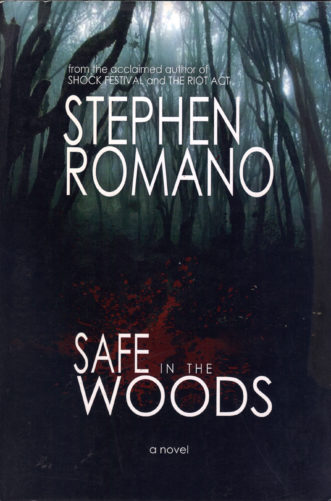 By STEPHEN ROMANO (Shock Festival Press; 2010)
By STEPHEN ROMANO (Shock Festival Press; 2010)
That title is literal: this novel really does concern a safe located in the woods, specifically an underground enclosure in rural Arkansas that holds a massive amount of cash. This safe was constructed by several desperate men under the orders of an extremely well-connected psychopath, and its existence is known only to a select few—among them the protagonist, a drug dealer/killer/all-around fuck-up, and an acquaintance known as “Nic Cage” who helped build the safe in the woods.
But I’m getting ahead of myself, and a narrative whose main plot point doesn’t kick in until well past the halfway point. I like this book: it’s a blistering, deeply felt and altogether unusual slice of pulp fiction that incorporates political overtones and some deeply intense splatter that reportedly got it in trouble with mainstream publishers. I say that’s definitely a point in the novel’s favor—even if it is a bit of a mess.
SAFE IN THE WOODS currently exists in a “micro-edition” of just 50 copies. A nonfiction afterward details the problems Stephen Romano had getting it published, and how it attracted the attention of a major publisher that wanted changes Romano wasn’t willing to make. Apparently this novel will be released in a wider print run next year (postscript: it wasn’t).
The protagonist is the self-monikered Marion “Winnie” Winston, an Austin based drug dealer on the run. The reasons for Winnie’s flight are explained in a series of lengthy flashbacks that weigh down the novel’s first half considerably, but are just the start of what nearly becomes a running joke, as nearly every character Marion meets has his or her own extremely involved flashback.
Anyone who’s read Romano’s faux-nonfiction novel SHOCK FESTIVAL knows he’s got a real gift for creating interesting and unique characters, and SAFE IN THE WOODS contains many fascinating (if uniformly sleazy and depraved) individuals. There’s Lolly the comic book store owner/mafia mistress and the aforementioned Nic Cage, so nicknamed for his longing to drink himself to death a la Cage’s character in LEAVING LAS VEGAS, and also Winnie himself, a streetwise hustler who’s also extremely wise and pop culture savvy.
What ultimately happens to Winnie is nasty and relentless, in keeping with the novel’s overall thrust. It’s a profoundly gritty, splat-happy ride with all manner of torture and mutilation. Yet Stephen Romano’s pointed, confident prose and imaginative richness are undeniable—as is the wonkiness of his overbaked narrative.
